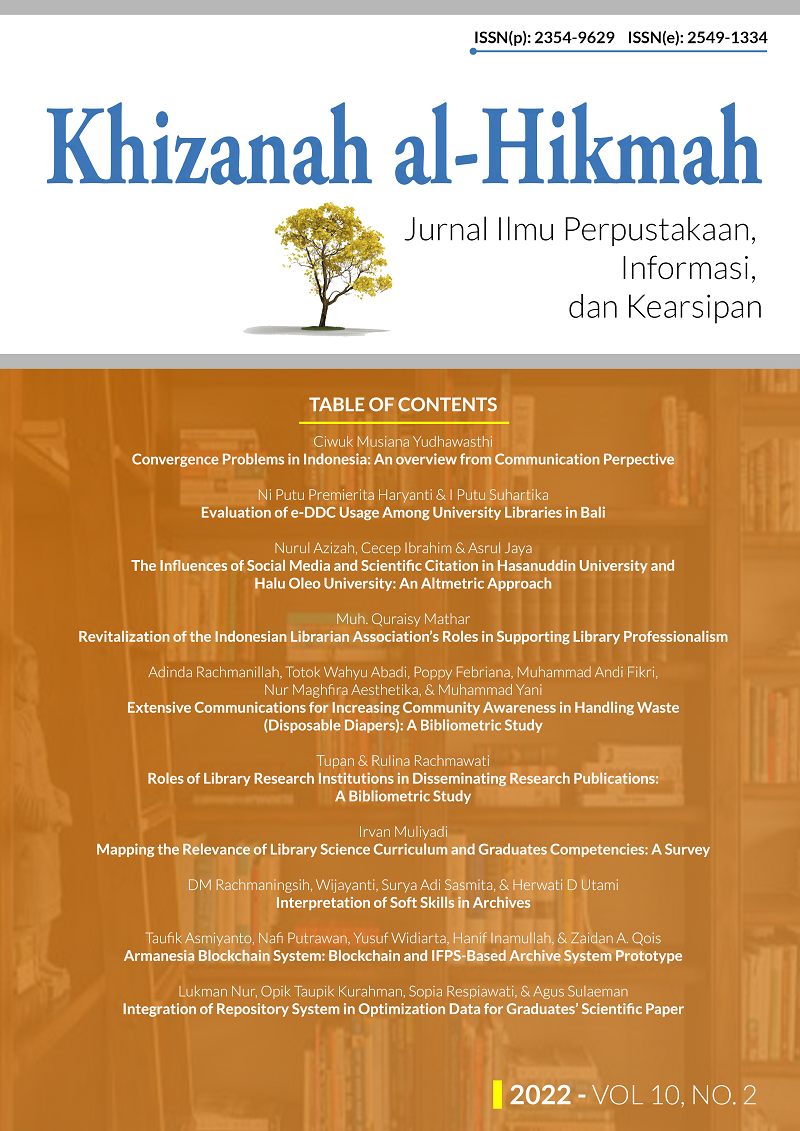Interpretation of Soft Skills in Archives
Abstract
To meet the demands of the workplace, archivists need to understand how soft skills develop. Digital technology development is a task that needs to be accelerated right away. This article attempts to discuss the findings of studies on how archivists work from home (WFH) during the COVID-19 pandemic in Indonesia led to developing soft interpretative skills. A case study approach was employed in this descriptive qualitative research. Questionnaires and interviews were used as the primary data-collecting methods for samples from the local government, the business sector, and ANRI. The findings demonstrated that the perception of soft skills has evolved into an implicative function rather than a meaning-based one. Based on the study's findings, it was determined that soft skills provide an essential and crucial purpose, precisely the demand for digital literacy. It was also determined that the implementation of WFH during the COVID-19 pandemic demonstrated the use of digital literacy abilities.
Downloads
References
Allen, T. D., Johnson, R. C., Kiburz, K. M., & Shockley, K. M. (2013). Work-Family Conflict and Flexible Work Arrangements: Deconstructing Flexibility. Personnel Psychology, 66(2), 345–376. https://doi.org/10.1111/peps.12012
Annibras, N. R. (2016). HERMENEUTIKA J.E. GRACIA (Sebuah Pengantar). Al-Bayan: Jurnal Studi Ilmu Al- Qur’an Dan Tafsir, 1(1), 71–78. https://doi.org/10.15575/al-bayan.v1i1.1669
Beena Johnson. (2021). Soft Skills - Essential for Success. BMH Medical Journal, 8(3), 99–102. https://www.babymhospital.org/BMH_MJ/index.php/BMHMJ/article/view/311>
Catriana, E. (2020, July 20). Mau Melamar Kerja di Era WFH? Ini Keterampilan Yang Perlu Kamu Kuasai. Kompas. https://money.kompas.com/read/2020/07/20/073515126/mau-melamar-kerja-di-era-wfh-ini-keterampilan-yang-perlu-kamu-kuasai?page=all#page2
Dewi, M., Sari, Y. R., Amna, S., Rasmita, & Susanti, R. (2019). The understanding of lecturers about the new literacy in industrial revolution era 4.0: a study case of university of putra indonesia yptk padang. Journal of Physics: Conference Series, 1339(1), 12105. https://doi.org/10.1088/1742-6596/1339/1/012105
Gracia, J. J. E. (1995). A Theory of textuality: The Logic and Epistemology.
Gulati, R., Reaiche, C., & Reaiche, C. H. (2020). Soft Skills: A Key Driver for Digital Transformation Hong Kong Arts Festival View project Necessity of Soft Skills in Project Managers and its Contribution to their Project(s) View project Soft Skills: A Key Driver for Digital Transformation. https://www.researchgate.net/publication/346171713
Heckman, J. J., & Kautz, T. (2012). Hard evidence on soft skills. Labour Economics, 19(4), 451–464. https://doi.org/10.1016/j.labeco.2012.05.014
ITU. (2022). International Telecommunication Union . https://digital-skills-jobs.europa.eu/en/organisations/international-telecommunication-union-itu
Kovacs, I. (2021). Digital Marketing Soft Skills and University Students’ Perceptions of Employability. GiLE Journal of Skills Development, 1(1), 25–36. https://doi.org/10.52398/gjsd.2021.v1.i1.pp25-36
Lambert, A. D., Marler, J. H., & Gueutal, H. G. (2008). Individual differences: Factors affecting employee utilization of flexible work arrangements. Journal of Vocational Behavior, 73(1), 107–117. https://doi.org/10.1016/j.jvb.2008.02.004
Lase, D. (2019). Pendidikan di Era Revolusi Industri 4.0. SUNDERMANN: Jurnal Ilmiah Teologi, Pendidikan, Sains, Humaniora Dan Kebudayaan, 12(2), 28–43. https://doi.org/10.36588/sundermann.v1i1.18
Livingstone, S., Mascheroni, G., & Stoilova, M. (2021). The outcomes of gaining digital skills for young people’s lives and wellbeing: A systematic evidence review. New Media & Society, 146144482110431. https://doi.org/10.1177/14614448211043189
Majid, S., Liming, Z., Tong, S., & Raihana, S. (2012). Importance of Soft Skills for Education and Career Success.
Mattew B Miles, A. Michael Huberman, & Johnny Saldana. (2020). Qualitative Data Analysis: A Methods Sourcebook (4th ed.). Sage Publication.
Rachmaningsih, D. M., & Wijayanti, W. (2021). Keberhasilan Kompetensi Literasi Digital Sebagai Tolak Ukur Soft Skills Mahasiswa Lulusan Kearsipan. BACA: Jurnal Dokumentasi Dan Informasi, 42(1), 131. https://doi.org/10.14203/j.baca.v42i1.693
Rahman, R., Sakti, A. W., Widya, R. N., & Yugafiati, R. (2019). Elementary Education Literacy in the Era of Industrial Revolution 4.0. Proceedings of the Second Conference on Language, Literature, Education, and Culture (ICOLLITE 2018). https://doi.org/10.2991/icollite-18.2019.41
Utami, F. A. (2020, March 16). Apa Itu Work From Home? Warta Ekonomi. https://wartaekonomi.co.id/read276630/apa-itu-work-from-home
Widarto. (2012). Model Pendidikan Vokasi Yang Efektif dan Efisien. http://staffnew.uny.ac.id/upload/131808327/penelitian/Model+Pendidikan+Vokasi.pdf
Zhou, H., Lu, S., Chen, J., Wei, N., Wang, D., Lyu, H., Shi, C., & Hu, S. (2020). The landscape of cognitive function in recovered COVID-19 patients. Journal of Psychiatric Research, 129, 98–102. https://doi.org/10.1016/j.jpsychires.2020.06.022
Copyright (c) 2022 Dewi Maharani

This work is licensed under a Creative Commons Attribution-NonCommercial-ShareAlike 4.0 International License.
By submitting your manuscript to our journal, you are following Copyright and License

